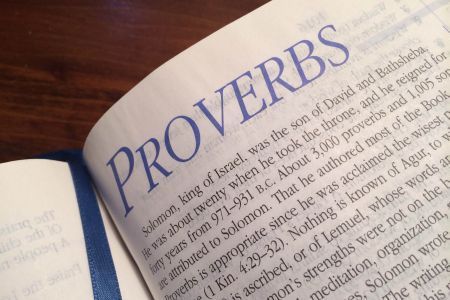Liz Curtis Higgs's Blog, page 14
January 29, 2014
Your 50 Favorite Proverbs: #48 No Fooling

If you love to goof around, act silly, or make people laugh—no worries. That’s not the kind of foolishness we’re talking about.

Instead, God uses the word fool to show us how to be wise.
The way of fools seems right to them,
but the wise listen to advice. Proverbs 12:15
Short but powerful, this verse points us in the right direction—away from egotism and pride, and toward humility and a teachable spirit.

The way…
Foolish people “suppose their way is straight” (CJB), when it’s clearly crooked. They “follow their own directions” (VOICE), rather than reading God’s map.
My-Way-or-the-Highway thinking never gets us where we want to go. If you’ve walked down that road, you know what a truly dead end it is. So been there. So done that. So grateful for God’s infinite mercy.
…of fools…
Here’s how God describes those of us who’ve been foolish: we’re “stubborn” (GW), “headstrong” (MSG), and “stupid” (GNT). Yes, yes, and yes.
It’s plural—fools—so at least we’re not alone, but I’d rather avoid going through life wearing a dunce cap. Not very flattering.
Want a perfect example of a fool? Abigail said of her first husband, Nabal: “He is just like his name—his name means Fool, and folly goes with him” (1 Samuel 25:25). Nabal was a rich man, but poor when it came to wisdom, refusing to offer hospitality to David and his army, rather than offering thanks for the services David had rendered.
Abigail, an “intelligent woman” (1 Samuel 25:3), used her wisdom to save the day—and in doing so, captured the heart of David.
No fool, that girl.
For the rest of us, what may sound like wisdom is often foolishness itself.


…seems right to them,…
This is the kind of thinking that gets us in trouble. It’s the world’s wisdom, but it’s definitely not God’s wisdom. I’ve discovered my choices are not always the right ones. And happiness depends on my relationship with the Lord and with others, not on making myself happy.
Rather than asking questions, a fool trusts “his own opinion” (NET). He does what is “right in his own eyes” (HCSB), instead of what is truly right. Fools “think they know what is best” (CEV), and end up making things worse.
In a nutshell, fools “always think they are right” (GNT).
Groan. This verse cuts way too close to the bone.
…but…
If you’ve been following my weekly studies, you know I love the word but in Scripture! Like a hinge on a door, but either leads to another possibility or makes an important comparison.
For such a little word, but carries a big punch. Of our fifty favorite verses in Proverbs, fifteen have the word but (the easiest word we’ll memorize). In Proverbs 12:15, the bad approach to life comes first, followed by the good one.
We’re ready for a better option, Lord. A way out. A solution.

…the wise…
The opposite of a fool is “a sensible person” (CEV). Someone who doesn’t do what fools do. So, they’re not stubborn, they’re flexible. They’re not headstrong, they’re cooperative. They’re not stupid, they’re smart.
What do they do that makes them so wise? They open their ears.
…listen to…
One of the qualities people look for in a spouse, an employee, a friend, a leader is this: they listen. They “pay attention” (CJB). They have ears to hear, and they use them.
They not only listen, they act. A wise person is “he who heeds” (NKJV). Few things are more frustrating than offering wisdom to someone who’s about to do a foolish thing, only to have them nod in agreement, then go off and do it anyway.
Arrgh.
Wise people know better. They listen, learn, and follow.

…advice.
When someone who knows what they are talking about offers useful “counsel” (ASV) or “good teaching” (NLV), the wise person says, “Great idea!” The fool says, “No, thanks. I’ve got this.” Right.
It’s humbling to seek advice, to raise our hands, to admit we need help. Yet that’s what God calls smart.
The best part? When wise people heed advice, it makes them even wiser. Talk about a great return on investment!
The way of fools seems right to them,
but the wise listen to advice. Proverbs 12:15
Now it’s your turn
Just one question for you:
Think of something that seemed right to you at the time—
and what you learned from the experience.
Kindly take a moment to Post a Comment below. Your honesty will help us all grow wiser.
Meanwhile, here’s your Printable of Proverbs 12:15, with four copies of the verse to cut apart and post wherever they’ll come in handy. And check out the pin I created for us on Pinterest.
For those of us who are committing these verses to heart, a quick review:
Let love and faithfulness never leave you;
bind them around your neck,
write them on the tablet of your heart. Proverbs 3:3
For the Lord gives wisdom;
from his mouth come knowledge and understanding. Proverbs 2:6
A person finds joy in giving an apt reply—
and how good is a timely word! Proverbs 15:23
The way of fools seems right to them,
but the wise listen to advice. Proverbs 12:15
Well done! Next Wednesday we’ll see the light with #47.
Your sister, Liz
@LizCurtisHiggs #50Proverbs

January 23, 2014
Your 50 Favorite Proverbs: #49 Right Time, Right Word

Remember how good it felt to raise your hand in school when you knew you had the right answer? You couldn’t wait for the teacher to call on you, couldn’t wait to hear her say, “Yes! Well done.”
Not much different now, really, when you’re in a Bible study, and the leader asks someone to share what they’ve learned from a passage.
Pick me, pick me.

When God gives us good words to say, we need to speak up. But if we’re not careful, we’ll be that guy (or girl). You know the one. Full of pride, showing off, wanting to impress, forgetting where that knowledge or insight came from in the first place.
Especially for those of us who love to hear the sound of our own voice (we know who we are), here’s a word from Proverbs we can all to take to heart.
A person finds joy in giving an apt reply—
and how good is a timely word! Proverbs 15:23

A person finds joy…
Joy is an all-good thing. No calories, no cost, no worries, no down side. Good for the body, good for the soul.
The Hebrew word used here means “gladness, mirth,” so we’re talking a serious party. Not just short-lived happiness, but “great joy” (VOICE) that lasts a long time. Like maybe forever. And it’s universal, something “everyone enjoys” (NLT).
Okay, we’re in.
But there’s a catch. This joy is outward focused. We do it for the good of someone else, and not for ourselves. The “pleasure” (MSG) we experience is a by-product of doing the right thing. Or, in this case, saying the right thing.
Want more joy in your life? Speak words that bless others.

…in giving an apt reply—
I may be an English major, but I seldom use a phrase like “apt reply” when I’m talking to a friend. Kinda stuffy. “A good answer” (ERV) or “good advice” (EXB) helps me grasp what God is saying, which I believe is this:
When someone asks you a question, and the answer you give them is “appropriate” (CEB) or “fitting” (NLT) or “suitable” (WYC), that means the Lord has used you to dish out a blessing.
So, who gets the glory for this apt reply? Right. God, not us.
As a writer, my own words come slowly, even painfully. They are not the words most people remember. Ever.
When the Holy Spirit steps forward and breathes life into us, suddenly our words have power. God’s power, not ours. God’s wisdom, not ours.
I’m guessing you’ve had an experience similar to one of these two:
A friend asks you a tough spiritual question. Immediately, almost effortlessly, a wise and biblical answer pours out of your mouth, one that meets her needs and solves her problem. You think, Where did that come from?
It came from God.
Or you’re asked to speak, so you carefully prepare a message. Then, right in the middle of your speech, an unplanned comment pops out that just rings true. The audience nods or claps or shouts “Amen.” All the while you’re thinking, Man, I need to write that down!
Yes, you do.
Another translation of Proverbs 15:23 reads, “Joy belongs to a man with answers in his mouth” (LEB). Too right. When you are fully aware that the answers you speak are God working through you to bless another believer…well, that’s joy.
Shared joy, at that.

…and how good is…
Good is a word that’s easy to discount. On a scale of Horrible to Fabulous, humble good falls in the middle somewhere. We equate it with “okay” or “average” or “nice.”
That’s not how this good works. Oh no. Think “wonderful” (TLB), “beautiful!” (MSG), “delightful” (NASB). Think “good!” (GW) with an exclamation point. Fact is, “there is nothing better” (ERV) and it’s “always best” (WYC).
When my son sees something he likes and responds, “Sweet!” (VOICE). he’s saying more than he knows.
Just for fun, try this today: Whenever you see the word good, mentally drop one o and see if it reveals the source of that goodness: God. From the very beginning, “God saw that it was good” (Genesis 1:10). He defines good in terms of himself. All that he makes is good. Including you, beloved.

…a timely word!
We read a Scripture someone posted on Facebook or scribbled on a greeting card, and think, “That is exactly the word I needed from God today!”
Yes, it is. Exactly.
God offers “just the right word” (GNT) to meet our needs, to alter our thinking, to change our hearts, to shape our behavior. It comes “at the right moment” (AMP) and is “spoken in due season” (KJV). That’s how much God loves you. He knows your needs, your hurts, your seasons. And he often meets those needs through another one of his children.
As it happens, I wrote this post while traveling through the Holy Land with a group of lifelong friends. (Now you know why I’m a day late. SO sorry!) How good is God, to have chosen this verse for this week, while the six of us are living out Proverbs 15:23 as we open his Word, seek his truth, and encourage one another with timely words.
Wherever this week finds you, I pray you too will experience his kind of JOY.
A person finds joy in giving an apt reply—
and how good is a timely word! Proverbs 15:23
Now, here’s your Printable of Proverbs 15:23, with four copies of our verse on a single page. Cut them apart and post them where they’ll help you imprint God’s Word on your heart.
You’ll also find our verses on Pinterest, with a new addition each week. Love doing these for you!
Now it’s your turn
Just one question for you:
Have you ever had an experience like the two I mentioned, when you sensed God offering a timely word through you? Describe it for us.
Please post your comment below. We love learning from you!
Can’t wait to dive into #48 next Wednesday, coming to you live from Jerusalem.
Your sister, Liz
@LizCurtisHiggs #50Proverbs

January 15, 2014
Your 50 Favorite Proverbs: #50 Wisdom’s Source

What’s the best place to eat? Consult a bona fide foodie. Need a different hair stylist? Ask a friend with a fabulous cut. Time to get a new camera? Check with a photographer.
When we want helpful solutions to life’s simple questions, we have options.
But when easy answers fall short, when we long for Truth with a capital T, when our hearts ache for something we can’t even name, there is only one place to turn.
For the Lord gives wisdom;
from his mouth come knowledge and understanding. Proverbs 2:6

Ann, who chose this verse as her favorite from Proverbs, admits how “often has God given me direction and answers when I needed them.” A brief testimony to a profound reality: God cares about everything that matters to us.
That thing you think is too small, too insignificant for God’s attention? He not only cares about it, he also knows what to do about it.
Friends may offer sympathy, a tissue, a listening ear, but God brings us what we really need.

For the Lord gives wisdom;… Proverbs 2:6
People are quick to hand out opinions—“I think this” or “I believe that”—but when God speaks to our hearts, he is “the source” (ERV) and he “gives out Wisdom free” (MSG).
Free. Let that sink in for a moment. Free. Freeing. Freedom.
When we buy a Bible—his Word, his truth—we are paying for the printing and the binding, the translating and the editing, but the wisdom it contains is free.
“For the Lord grants wisdom!” (NLT) He gives away the deepest secrets of the universe, and shares with those he loves his “skillful and godly Wisdom” (AMP).
Need some? Just ask. “If any of you lacks wisdom, you should ask God, who gives generously to all without finding fault, and it will be given to you” (James 1:5).
Free is as generous as it gets.
If we spent countless dollars and the whole of our lives trying to read every book on every shelf, we still wouldn’t have what God is offering us at no charge.

…from his mouth come… Proverbs 2:6
He spoke the world and all it contains into existence. “And God said, ‘Let there be light,’ and there was light” (Genesis 1:3). He is still speaking, beloved. He has never stopped speaking. His wisdom falls on us like rain from the heavens, watering our souls, planting seeds, bearing fruit.
“The words I speak are like that.
They will not return to me without producing results.
They will accomplish what I want them to.
They will do exactly what I sent them to do.” (Isaiah 55:11 NIRV)
His spoken Word, his written Word, his living Word not only pours out of God’s mouth, it’s meant to pour out of our mouths when we teach, when we preach, when we speak.
Someday, when I work up the courage, I’m going to stand in front of an audience and simply read the Word of God. No commentary, no asides, no Lizzie Revised Version, just verse by verse with all the passion and commitment and excitement his Word deserves.
Oh! Just think what might happen if we got out of the way and let God’s Word go forth, believing in its ability to transform us, to recreate us in the image of his Son.
Doesn’t it just want to make you stand up and shout?
Glory!

…knowledge and understanding. Proverbs 2:6
Knowledge is power, all right—the power of God, the One who knows everything.
A dozen years ago, Donald Rumsfeld, then U.S. Secretary of Defense, made this classic statement about knowledge: “There are known knowns. There are things we know that we know. There are known unknowns. That is to say, there are things that we now know we don’t know. But there are also unknown unknowns. There are things we do not know we don’t know.”
Seriously? Unknown unknowns? People are still laughing about that one.
Except there really are things we don’t know we don’t know. And all those things? Those are the things God knows.
He is Lord over our unknown unknowns. He is in command of our lives from beginning to earthly end and on to eternal glory.
“As the heavens are higher than the earth, so are my ways higher than your ways and my thoughts than your thoughts” (Isaiah 55:9). When we throw up our hands and say, “I don’t get it, Lord,” he says, “Exactly!”
I am so grateful God gets what we don’t get, knows what we don’t know, and loves us where we are. His “true knowledge and insight” (VOICE), his “prudence” (DRA), his “intelligence” (JUB), stretch far beyond the stars, yet he graciously extends them to us.
This is a God who cares, who sees a need and meets it with the one thing he knows will change us: his wisdom, his Word. This week’s verse, our first of 50, neatly sums up the whole book of Proverbs. Clever you, for choosing this as one of your favorites.
Are you ready to write it on the tablet of your heart?
For the Lord gives wisdom;
from his mouth come knowledge and understanding. Proverbs 2:6
Now, here’s your Printable for Proverbs 2:6, with four copies of this week’s verse on a single page. Why not cut them apart and post them where they’ll do the most good?
I also created a pin for you on Pinterest, which I confess took me so long to fiddle with, I had the verse memorized by the time I was done. Hmmm. You don’t suppose that was God’s plan all along?
Now it’s your turn
Just one question for you this week:
What is God asking you to do with his free gift of wisdom,
knowledge, and understanding?
If you can, take a moment to Post a Comment below. One of the blessings of studying God’s Word together is sharing what we’re learning.
Can’t wait to unpack #49 next Wednesday. It has the word joy in it, so you know I’m happy!
Your sister, Liz
P.S. A quick review of last week’s verse. You know, the one we memorized.
Let love and faithfulness never leave you;
bind them around your neck,
write them on the tablet of your heart. Proverbs 3:3

Your 50 Favorite Proverbs: Wisdom’s Source

What’s the best place to eat? Consult a bona fide foodie. Need a different hair stylist? Ask a friend with a fabulous cut. Time to get a new camera? Check with a photographer.
When we want helpful solutions to life’s simple questions, we have options.
But when easy answers fall short, when we long for Truth with a capital T, when our hearts ache for something we can’t even name, there is only one place to turn.
For the Lord gives wisdom;
from his mouth come knowledge and understanding. Proverbs 2:6

Ann, who chose this verse as her favorite from Proverbs, admits how “often has God given me direction and answers when I needed them.” A brief testimony to a profound reality: God cares about everything that matters to us.
That thing you think is too small, too insignificant for God’s attention? He not only cares about it, he also knows what to do about it.
Friends may offer sympathy, a tissue, a listening ear, but God brings us what we really need.

For the Lord gives wisdom;… Proverbs 2:6
People are quick to hand out opinions—“I think this” or “I believe that”—but when God speaks to our hearts, he is “the source” (ERV) and he “gives out Wisdom free” (MSG).
Free. Let that sink in for a moment. Free. Freeing. Freedom.
When we buy a Bible—his Word, his truth—we are paying for the printing and the binding, the translating and the editing, but the wisdom it contains is free.
“For the Lord grants wisdom!” (NLT) He gives away the deepest secrets of the universe, and shares with those he loves his “skillful and godly Wisdom” (AMP).
Need some? Just ask. “If any of you lacks wisdom, you should ask God, who gives generously to all without finding fault, and it will be given to you” (James 1:5).
Free is as generous as it gets.
If we spent countless dollars and the whole of our lives trying to read every book on every shelf, we still wouldn’t have what God is offering us at no charge.

…from his mouth come… Proverbs 2:6
He spoke the world and all it contains into existence. “And God said, ‘Let there be light,’ and there was light” (Genesis 1:3). He is still speaking, beloved. He has never stopped speaking. His wisdom falls on us like rain from the heavens, watering our souls, planting seeds, bearing fruit.
“The words I speak are like that.
They will not return to me without producing results.
They will accomplish what I want them to.
They will do exactly what I sent them to do.” (Isaiah 55:11 NIRV)
His spoken Word, his written Word, his living Word not only pours out of God’s mouth, it’s meant to pour out of our mouths when we teach, when we preach, when we speak.
Someday, when I work up the courage, I’m going to stand in front of an audience and simply read the Word of God. No commentary, no asides, no Lizzie Revised Version, just verse by verse with all the passion and commitment and excitement his Word deserves.
Oh! Just think what might happen if we got out of the way and let God’s Word go forth, believing in its ability to transform us, to recreate us in the image of his Son.
Doesn’t it just want to make you stand up and shout?
Glory!

…knowledge and understanding. Proverbs 2:6
Knowledge is power, all right—the power of God, the One who knows everything.
A dozen years ago, Donald Rumsfeld, then U.S. Secretary of Defense, made this classic statement about knowledge: “There are known knowns. There are things we know that we know. There are known unknowns. That is to say, there are things that we now know we don’t know. But there are also unknown unknowns. There are things we do not know we don’t know.”
Seriously? Unknown unknowns? People are still laughing about that one.
Except there really are things we don’t know we don’t know. And all those things? Those are the things God knows.
He is Lord over our unknown unknowns. He is in command of our lives from beginning to earthly end and on to eternal glory.
“As the heavens are higher than the earth, so are my ways higher than your ways and my thoughts than your thoughts” (Isaiah 55:9). When we throw up our hands and say, “I don’t get it, Lord,” he says, “Exactly!”
I am so grateful God gets what we don’t get, knows what we don’t know, and loves us where we are. His “true knowledge and insight” (VOICE), his “prudence” (DRA), his “intelligence” (JUB), stretch far beyond the stars, yet he graciously extends them to us.
This is a God who cares, who sees a need and meets it with the one thing he knows will change us: his wisdom, his Word. This week’s verse, our first of 50, neatly sums up the whole book of Proverbs. Clever you, for choosing this as one of your favorites.
Are you ready to write it on the tablet of your heart?
For the Lord gives wisdom;
from his mouth come knowledge and understanding. Proverbs 2:6
Now, here’s your Printable for Proverbs 2:6, with four copies of this week’s verse on a single page. Why not cut them apart and post them where they’ll do the most good?
I also created a pin for you on Pinterest, which I confess took me so long to fiddle with, I had the verse memorized by the time I was done. Hmmm. You don’t suppose that was God’s plan all along?
Now it’s your turn
Just one question for you this week:
What is God asking you to do with his free gift of wisdom,
knowledge, and understanding?
If you can, take a moment to Post a Comment below. One of the blessings of studying God’s Word together is sharing what we’re learning.
Can’t wait to unpack #49 next Wednesday. It has the word joy in it, so you know I’m happy!
Your sister, Liz
P.S. A quick review of last week’s verse. You know, the one we memorized.
Let love and faithfulness never leave you;
bind them around your neck,
write them on the tablet of your heart. Proverbs 3:3

January 8, 2014
Your 50 Favorite Proverbs: Write Them on Your Heart

So, what is a proverb? Wisdom captured in a sentence. Truth that holds its ground through the ages. A familiar statement expressing a common belief.
Yet the Bible’s book of Proverbs carries far more weight than mere human wisdom. It’s the Lord’s truth, poured through the hearts of men and women, from the sayings of “Solomon son of David” (Proverbs 1:1) to the “inspired utterances” of King Lemuel’s mother (Proverbs 31:1).
Proverbs teach us not just how to think, but also how to do “what is right and just and fair” (Proverbs 1:3). They’re designed to make us behave differently. They’re meant to be life changing, and they are.
In the year ahead, do you long to be more like the Lord you love? More purposeful, more peace filled, more grace giving, more generous? Then join us on our journey through Proverbs. God has much to teach us, and I can’t wait to learn with you!

There are 915 verses in the 31 chapters of Proverbs. At the end of today’s short study, I’ll ask you to share just one of your favorite verses. We already explored Proverbs 3:5-6 last summer, so that leaves 913 other verses for you to pick from!
First we’ll study one of the Proverbs I love, just to get the ball rolling. Then next week, we’ll begin looking at your favorites, starting with # 50. Maybe you’d like to memorize them with me? We can handle one verse a week, right? More on that in a moment.
Here we go, my friends, leaping into God’s Word with joy and abandon!
Let love and faithfulness never leave you;
bind them around your neck,
write them on the tablet of your heart. Proverbs 3:3

Let love and faithfulness never leave you;… Proverbs 3:3
From God’s point of view, love and faithfulness are inseparable. One can’t exist without the other.
Because God loves us, he remains ever faithful.
Because God is faith itself, his love is never ending.
Whether translated as “loyalty and kindness” (NLT) or “grace and truth” (CJB), this powerful pairing comes from the Hebrew words hesed, meaning “favor, mercy, loving-kindness,” and emeth, meaning “firmness, faithfulness, truth.”
Such phrases are drenched in goodness, sweet as honey, deeply satisfying—the very opposite of “hatred and selfishness,” of “hypocrisy or falsehood” (AMP).
Sadly, that’s the world we live in. We harbor negative feelings toward others. We insist on doing things our way and for our benefit. We call people two-faced, even as we cover our own duplicity with a smile.
Some days even the best of us can act like the worst of us.

This proverb shows us the way out: “Don’t lose your grip on Love and Loyalty” (MSG) and “do not lose sight of mercy and truth” (VOICE). How do we do that? Tighten our grip on God and focus our eyes on him.
Seek the Lord before you turn to an earthly friend, however wise.
Read his Word before you open another book, however edifying.
God knows we can’t drum up these righteous qualities on our own. That’s why his love and faithfulness are woven into our very being by the power of the Holy Spirit. The love is all his, the loyalty is all his, yet it’s firmly planted in us. Amazing.
He urges us not to leave his grace and truth unexercised, but to put them into action. As Matthew Henry wrote, “live upon them, and take the comfort of them.”
Want to fully experience the love of God? Love others.
Want to understand how God can be faithful to you? Be faithful to others.
Lord, why do we always complicate what you make clear?
…bind them around your neck,… Proverbs 3:3
This phrase is so visual, so tactile. Imagine slipping God’s sacred words onto a silver chain so you can “wear them like a necklace” (NCV), displaying his loyalty and kindness for all to see.
If God means for us to literally “tie them” (ERV) around our neck, “as a reminder” (NLT), this Scripture jewelry, and other pieces like it, provide a way to do just that.
Yet there are deeper truths to be found in this proverb. One of the most accurate places to measure a heartbeat is the carotid artery in the neck. Perhaps the Lord intends for us to check our spiritual pulse. To press in and ask hard questions.
Does my heart truly beat for the Lord? Is his Word active in me? Or am I dead to Christ and alive to the world?

The truth is, we hold closest to our hearts what we value most.
When I was twelve, my first crush gave me his wooden ring (all the rage back in the day), and I gave him mine. His ring was too big for my finger, so I wore it on a leather cord around my neck. All the time. Even if it clashed with my outfit, I wouldn’t dream of neglecting his gift to me.
That ring told the world I was chosen.
That ring assured me I was cherished.
And that leather cord around my neck? Gently rubbing against my skin? A constant reminder of the one I cared about.
God deserves to be remembered. Every day, every hour, every minute.

…write them on the tablet of your heart. Proverbs 3:3
We have all sorts of tablets now, from spiral-bound ones to sleek digital models with myriad apps.
But such tablets are easily broken, stolen, or lost forever.
So, God asks us to store his wisdom in a more permanent place, “deep within” (NLT), on the “tables of thy heart” (DRA). The same Hebrew word describes “the tablets of stone inscribed by the finger of God” (Exodus 31:18), which the Lord covered with his commandments and entrusted to Moses.
The tablets God writes on now are anything but stone. He wants his truths etched “in your mind” (CEV) so you can “meditate on them” (VOICE). That’s why memorizing Scripture is so valuable.
I’m grateful to have God’s Word on my mobile, my Kindle, my laptop, my bookshelf, but where it makes the most difference is in my heart.
Each time I write or speak, this is my prayer: “Let the words of my mouth and the meditation of my heart be acceptable in your sight, O Lord, my rock and my redeemer” (Psalm 19:14).
When his words of love are in my mind, they are more likely to pour out of my mouth. That’s why I’m practicing this week’s verse aloud, committing it to memory. Join me?
Let love and faithfulness never leave you;
bind them around your neck,
write them on the tablet of your heart. Proverbs 3:3
My daughter and I created a pretty Printable for Proverbs 3:3, with four copies of our memory verse on a single page. Cut them apart to tack on your bulletin board, post on your fridge, slip in your purse, prop on your desk—anything to keep God’s Word front and center this week.

Now it’s your turn
Chose one verse you love from the book of Proverbs.
Share it below under “Post a Comment.”
Include the whole verse, if possible.
Add a brief sentence or two, if you wish, telling us why it’s your favorite.
Then join us next week as our countdown begins!
Your sister, Liz
@LizCurtisHiggs #50Proverbs #bgbg2

P.S. My sweet friend, Ann Voskamp, is also encouraging us to memorize God’s Word in 2014. Consider making room in your heart and mind for two dozen or more verses from the gospel of John. This is the year we all go deeper with God (and share the joy of doing so!).

December 31, 2013
The Women of Christmas: Joy of Every Longing Heart

There it is, plain as the words on the page: Anna the prophetess “worshiped night and day, fasting and praying” (Luke 2:37). Already I’m shaking my head. No way. No way could I do that. I convince myself she’s one of those Super Saints, made out of something different than the rest of us.
Then God bends down and silences my foolish thinking. Anna did not do those good deeds on her own. I am the One who did them through Anna.
I know this is true, and his Word confirms it: “For we are God’s handiwork, created in Christ Jesus to do good works, which God prepared in advance for us to do” (Ephesians 2:10).
Now I understand: God’s hands rested on Anna’s hands. He guided her, strengthened her, empowered her.

His hands rest on ours as well, beloved. When we ease our breathless pace, when we stop, look, and listen, we can sense the gentle weight of his touch, and take comfort in the warmth of his presence.
In this season, in every season, Immanuel: God with us.
Chapter Eight: Joy of Every Longing Heart
Read Luke 2:36–40
God placed Anna right where she belonged, both for his holy purpose and for her earthly joy: in the temple in Jerusalem.
Women of every age still gather outside the remaining western wall, especially Friday evenings at the start of Shabbat. They meet on the women’s side—on the right, as you face the wall. Many slip handwritten prayers into crevices and brush their fingertips across the crumbling surface. Some bow their heads, some lift their hands. Some weep.

Did Elizabeth touch the temple wall in passing? Did young Mary, when she came for her ritual purification that day? Did Anna, who made her home within those walls? To be sure, these women were real—as real as the ancient stones themselves.
This we know from Scripture: Mary hastened to Elizabeth’s side, then Anna hurried to stand by Mary, all three of them drawn to the Christ child.
Elizabeth anticipated his coming.
Mary welcomed his arrival.
Anna announced his presence.
For many of us, Anna was a surprise, the unexpected exclamation point at the end of the nativity story. Her name means “grace,” her family name means “face of God,” and her devotion was deep and wide.
Yes, she was eighty-four years old, but you’d never know it to watch her in action. Nearly four centuries ago, Rembrandt perfectly captured Anna’s enthusiasm. (I hope I did her justice on her golden Pinterest board too.)

“Coming up to them at that very moment…” (Luke 2:38). At the Holy Spirit’s prompting, Anna made a beeline for the babe in Simeon’s arms. We can feel her urgency, her excitement, her conviction.
When she opened her mouth, you know what poured out: “she gave thanks to God” (Luke 2:38).
Lord, don’t let me miss this. Open my eyes and ears and heart. Show me what it means to praise rather than complain, to be grateful rather than disgruntled.
After decades of worshiping and fasting and praying, Anna was prepared when she encountered the Savior. She was filled up, ready to spill out.
Instead of hobnobbing with the main players, making idle chitchat, Anna turned to everyone else in the temple courts that day, and “spoke about the child to all who were looking forward to the redemption of Jerusalem” (Luke 2:38).
Looking forward. It’s the perfect thing to do at story’s end.

Anna gazed beyond his birth, beyond his life, beyond his death, and straight through to his resurrection.
The people of God longed to be redeemed, but that was only possible through sacrifice. The stark reminder of that truth hung in the temple air—the spilling of blood, the bleating of lambs, the burning of flesh on the altar.
Did Anna know how much that innocent child would suffer to set his people free? You can be sure of it. She was a prophetess, which meant she not only heard from the Lord; she also knew what the ancient prophets foretold.
But he was pierced for our transgressions,
he was crushed for our iniquities;
the punishment that brought us peace was on him,
and by his wounds we are healed. Isaiah 53:5
Pierced, crushed, punished, wounded. Centuries before Christ walked the Way of Suffering, the prophet Isaiah assured God’s people, “A healer is coming.”
He has come, dear one. He is here.
Elizabeth, Mary, and Anna were prepared, and so they prepared the way. As I wrote in the final lines of The Women of Christmas, now it falls to us, two thousand years later, to follow in their footsteps.
To tell everyone we know everything we know about Jesus. To say words such as miracle and angel without apology, because they’re true. To see the light of Christ shining through the ages and lift our candles to light the way for others.
To join the heavenly host singing “Glory, glory, glory! Glory to God in the highest!”

From the Study Guide
Though Psalm 23:6 was written by David, his words could easily have been spoken by Anna: “Surely your goodness and love will follow me all the days of my life, and I will dwell in the house of the Lord forever.” Which aspect of Anna’s worship challenges you to go deeper?
The truth? Every aspect of her worship convicts me. God deserves more than a few crumbs that fall from my too-full calendar. He deserves my best. He deserves a heart of worship, night and day.
In The Practice of the Presence of God, Brother Lawrence wrote, “Let us occupy ourselves entirely in knowing God.” Right. That.
Prayer is part of my ongoing conversation with the Lord, with bursts of heartfelt petitions. Knowing God listens, cares, and answers according to his will is enough to keep me talking, though I fear I’ve become too casual. A daily reading from Psalms should help realign my grasp of his majesty and holiness.
Fasting? Well. I fasted for the first time in ages today while I wrote this post. In part I wanted to honor Anna. Mostly I wanted to remind myself what it’s like to feel empty, to look at the last of the Christmas cookies and resist the urge to grab one. It was harder than I’d remembered. And it was more rewarding than I’d imagined. I think Anna was on to something.
Now it’s your turn
Two questions I hope you’ll consider:
Was there something in Chapter Eight that popped off the page for you?
In what ways might God be asking you to dwell more closely with him in the year ahead?
Please respond under Post a Comment below. It means so much to all of us when you take time to share your thoughts.
Opening God’s Word with you has truly made this season merry and bright. The Women of Christmas blog series will live on my website for many seasons to come, along with the free Leader’s Guide, How to Use The Women of Christmas as a Bible Study.
Look below to see what I have planned beginning January 8th. I think you’ll find our weekly visits a bit shorter and more manageable, plus each post will stand alone and won’t be tied to a book or to a season. You can read them anytime that suits.
Until then, may the peace of Christ be yours in the new year and always!
Your sister, Liz
P.S. All through 2014 we’ll explore the beauty of Proverbs.
Can’t wait to share this all-new study with you!


December 26, 2013
The Women of Christmas: And Our Eyes at Last Shall See Him

When God reached down from heaven with the best gift of all, people near and far took notice. Shepherds quaked. Angels sang. Mary pondered. And scholars from the east followed his star, bright and shining, leading them toward Jerusalem.
The mission of the Magi is our mission now: seek him, find him, worship him.

Read Chapter Seven: And Our Eyes at Last Shall See Him
Read Matthew 2:1-12 and Luke 2:21–35
Most deluxe nativity sets include three wise men—no more, no less. Dressed in richly embroidered robes of burgundy and blue, these holy action figures bear gifts of gold, frankincense, and myrrh for the newborn king of the Jews.
When the real Magi of old appeared, searching for the Christ child, King Herod “became very agitated” (Matthew 2:3), and no wonder. Wasn’t he the king of Israel, by Rome’s decree?
Then the chief priests quoted the prophet Micah, telling Herod that out of Bethlehem would come “one who will be ruler over Israel” (Micah 2:5).
Trouble with a capital T, and in David’s hometown too.

Amid all the beauty of Christmas, it’s easy to forget this sobering truth: Jesus came to shake things up. His birth disturbed those who were wealthy and powerful, and gave hope to those who were poor and meek. Even at the start of things, when Jesus was growing in his mother’s womb, the Holy Spirit proclaimed through Mary, “He has brought down rulers from their thrones but has lifted up the humble” (Luke 1:52).
Herod was as eager as the Magi were to find this babe in swaddling clothes, but for entirely different reasons. Herod wanted to murder him. The Magi wanted to honor him.
These wise men followed his star until it stopped in Bethlehem “over the place where the child was” (Matthew 2:9). Right there. Can’t miss it.

Herod bowed to no one. But these venerable wise men “bowed down and worshiped” (Matthew 2:11) the Holy One.
I’m pierced through as I type these words, letting the truth cut through my pretense. Who or what do I bow to? Who or what do I worship? Is it always the Lord? Or is it also success, however that’s defined? Is it Facebook friends, Twitter followers, best-seller lists? Is it counting numbers, instead of changing lives?
God doesn’t care about numbers. He cares about the attitude of our hearts and the honesty of our words, spoken and unspoken. He is concerned with our motives, and which direction we turn for approval. He wants our undivided attention and utter devotion.
Would I travel a thousand miles to worship his Son, as these Magi did?
Do I give generously, expecting nothing in return?
I don’t like my answers. God is even less impressed.
And yet—oh, beloved, don’t miss this mind-blowing truth—even though he knows all the ways in which we fail him, he loves us still.
[image error]
I don’t know why, and I can’t explain how, except to say, God is faithful to his Word: “This is love: not that we loved God, but that he loved us”—reliable truth, with undeniable proof—“and sent his Son as an atoning sacrifice for our sins” (1 John 4:10).
He watched his Son die in agony so our sins would not be held against us. In God’s dictionary, this is love defined: not expensive presents under a fragrant fir, or costly gifts laid before a king, but a blameless child nailed to a leafless tree.
We may focus on the manger at Christmas and reserve the cross for Easter, but God had both in mind from the very beginning. Because he loves us. Because he came to earth to rescue us.
The innocent babe in Mary’s arms made all that possible.
Forty days after the Messiah was born, Mary and Joseph traveled to Herod’s Temple in Jerusalem for her purification rites. She offered what the law required—“a pair of doves or two young pigeons” (Luke 2:24)—but her greatest offering was the child she bore, long anticipated by a righteous man named Simeon.

The same Holy Spirit who’d poured prophetic words into Elizabeth and a holy seed into Mary also came upon Simeon (Luke 2:25), revealing that Simeon wouldn’t die until he’d seen the Lord’s Messiah (Luke 2:26), and prompting Simeon to move into the temple courts (Luke 2:27).
One look at the child, and Simeon gathered the boy in his embrace. Trusting of Mary, yes? She’d seen what the Holy Spirit could do, and recognized a kindred soul in this godly man.
Like so many of the main players in our story, Simeon opened his mouth and praised God (Luke 2:28), assuring the Lord he could now die in peace (Luke 2:29).
Again, that nudging of the Holy Spirit inside me. Could I die in peace this very night, having seen firsthand what our loving God can accomplish? Is my hold on this world as light as it should be? Is my gaze utterly fixed on eternity?
I hope so, I hope so, I hope so. Not terribly convincing, is it? Still, I am more aware each day that I’m one step closer to heaven.
Simeon was so certain of what God had in store for him, he could speak difficult truths to Mary without holding back: “And a sword will pierce your own soul too” (Luke 2:35). A word of preparation, rather than warning; spoken out of a longing to comfort, not a desire to wound.
In the same way, as we mature, we have more freedom to speak the words God places on our hearts. We are less worried about what others think of us, and more concerned with following God’s leading.
In the end, the only thing that matters is speaking the truth in love. Which brings us to Anna, our last woman of Christmas. Wait until you meet this sister! I truly have saved the best for last.

From the Study Guide
Once again the Holy Spirit played a quiet but significant part in the story, revealing to Simeon that he wouldn’t die until he saw the Messiah. Would such knowledge fill you with hopeful anticipation or fearfulness and dread? How can you best prepare for the day you see your Savior face to face?
I know, I know. Who talks about death at Christmastime?! Well, Simeon did, in a matter-of-fact, bring-it-on kind of way. I’m not in any hurry to leave this world, but I am ready. Of course, I’d love if it happened quickly and painlessly. And at least thirty years from now. LOL. But I trust God to know what’s best for me and for those I love.
What really matters is the One who is waiting for us on the other side. “For now we see only a reflection as in a mirror; then we shall see face to face” (1 Corinthians 13:12). Honestly, I get goose bumps just thinking about it. However many years we spend on this earth, they are nothing compared to eternity. Oh, Father, let us be like Simeon, trusting you so completely with our past, present, and future that we can say, “You may now dismissyour servant in peace” (Luke 2:29).
Now it’s your turn
Two questions I hope you’ll consider:
Was there something in Chapter Seven that spoke to your heart?
How can you best prepare for the day you see your Savior face to face?
Please respond under Post a Comment below. Your answers are a blessing to me and everyone who reads them.
Look for our final post on The Women of Christmas early on New Year’s Eve. Until then, may your awareness of our Messiah—who he is and why he came—shape the days ahead in unexpected ways.
Your sister, Liz

Beginning January 2014 (SO excited about this!)


December 24, 2013
The 12 Gifts of Christmas

by Liz Curtis Higgs
The traditional season of Christmastide or Twelvetide begins on December 25, with daily festivities and gift giving, culminating in a feast on Epiphany, January 6.
Rather than partridges in pear trees and endless drummers drumming, here are twelve sacred gifts, dear to the hearts of those who celebrate Christ year ’round. I hope you’ll enjoy opening each one!
[image error]
On the 1st day of Christmas our true love gave us LOVE: “See what great love the Father has lavished on us.” 1 John 3:1
On the 2nd day of Christmas our true love gave us HOPE: “For you are God my Savior, and my hope is in you all day long.” Psalm 25:5
On the 3rd day of Christmas our true love gave us WISDOM: “He gives wisdom to the wise and knowledge to the discerning.” Daniel 2:21

On the 4th day of Christmas our true love gave us JOY: “He will yet fill your mouth with laughter and your lips with shouts of joy.” Job 8:21
On the 5th day of Christmas our true love gave us PEACE: “He promises peace to his people, his faithful servants.” Psalm 85:8
On the 6th day of Christmas our true love gave us STRENGTH: “He gives strength to the weary, and increases the power of the weak.” Isaiah 40:29
[image error]
On the 7th day of Christmas our true love gave us GRACE: “His glorious grace, which he has freely given us in the One he loves.” Ephesians 1:6
On the 8th day of Christmas our true love gave us DIRECTION: “The Lord will guide you always; he will satisfy your needs.” Isaiah 58:11
On the 9th day of Christmas our true love gave us ASSURANCE: “We are his people, the sheep of his pasture,” Psalm 100:3

On the 10th day of Christmas our true love gave us FREEDOM: “It is for freedom that Christ has set us free.” Galatians 5:1
On the 11th day of Christmas our true love gave us PROTECTION: “He will keep me safe in his dwelling.” Psalm 27:5
On the 12th day of Christmas our true love gave us ETERNITY: “He has also set eternity in the human heart.” Ecclesiastes 3:11
May the new year ahead bring you closer to the One who loves you most!
Your sister, Liz
@LizCurtisHiggs #12GiftsofChristmas
P.S. Our last two chapters from The Women of Christmas are still to come. Since Mary’s encounters with Simeon and Anna follow after the Christ child’s birth, I thought we’d save Chapter 7 for Thursday, December 26 and Chapter 8 for Tuesday, December 31. Until then, blessings to you this Christmastide, beloved.

December 19, 2013
The Women of Christmas: The Wondrous Gift Is Given

Was it a census that sent Mary and Joseph on their long journey to Bethlehem? Or was it God?
You know the answer. “Many are the plans in a person’s heart, but it is the Lord’s purpose that prevails” (Proverbs 19:21). This was God’s plan from the very beginning, now unfolding on the road south from Nazareth.
Mary was “great with child” (Luke 2:5) as they traveled. We can only imagine how uncomfortable, unsettled, uneasy she felt. Where will my child be born, Lord? I am certain he will survive, but will I? Though Joseph has no recorded dialogue in Scripture, he no doubt encouraged his young bride, mile after difficult mile. I heard from an angel too, Mary. I know whose child you carry. I will care for you and keep you both safe.
A few miles beyond Jerusalem, the town of Bethlehem finally came into view. Nine months of expectation were over. Time for the Christ child to appear.

Chapter Six: The Wondrous Gift Is Given
Read Luke 2:1–20
In a grotto beneath the Church of the Nativity in Bethlehem, a silver star marks the traditional site where Jesus was born. But two thousand years ago, his birthplace looked nothing like this.
Mary labored in a lowly stable, and laid the Son of God in a feed trough meant for livestock. However fresh the hay, there was nothing clean about the place, nothing pleasant, nothing fragrant.
Even so, God came to us. Cast his lot with us. Became one of us.
“She gave birth to her firstborn, a son” (Luke 2:7). A handful of words, as simple and humble as her surroundings. Mary wrapped him in strips of cloth, cocooned him in linen, and held him close.

Surely she wiped away tears of joy and relief, kissed his brow with trembling lips, counted his fingers and toes, then took him to her breast.
Everything about this birth was both ordinary and extraordinary.
The Son of God wasn’t born to a princess; he was born to a poor, uneducated young girl. His first bed wasn’t covered in gold; it was stained with dung. He didn’t come in power; he came as a helpless newborn.
From his very first breath, the Son of God turned the world on its head. He identified with the poor, the meek, the lowly, rather than the rich, the influential, the popular. “He made himself nothing by taking the very nature of a servant” (Philippians 2:7).
Not this kind of servant…

…but this kind of servant.

The kind of servant who later said, “Sell everything you have and give to the poor, and you will have treasure in heaven” (Luke 18:22).
Mary had treasure on earth: the Son of God, nestled in her arms. We have an even greater treasure: the Spirit of God, residing in our hearts. He is the One who urges us to value what is truly valuable, and let go of things that aren’t treasure at all, but trash. Disposable, unnecessary.
An interesting lesson for the Christmas season, isn’t it? While we spend, spend, spend on gifts that are quickly forgotten, neglected, discarded, the Lord is gently reminding us, “The gift that matters is my Son, who came to earth with nothing.”
I don’t believe God is saying, “You must be poor,” but I do believe he is saying, “You must love the poor, serve the poor, care for the poor. Be willing to have less, so others might have more.”
And who were the first to come see God’s Son? Of course. Poor shepherds, living in the fields, with no roof over their heads except heaven.

If you’ve been reading The Women of Christmas, were you surprised to discover that shepherds in that time were despised and considered unreliable? How like God, to choose them as his witnesses. And oh, how he got their attention!
First one angel, shining in glory, proclaimed the “wonderful, joyous news” (Luke 2:10) and described how and where they would find this heavenly gift.
Then a whole host of angels filled the skies above Bethlehem, praising God and singing, “Gloria in excelsis Deo!” (Angels always sing in Latin, right?) Okay, then. “Glory to God in the highest heaven” (Luke 2:14) will do nicely.
And peace for those who love him. Peace with God, peace with one another.
The shepherds took off at a trot, the angels’ song still ringing in their hearts. Once they saw the child, they began spreading the news and giving God the glory. No wonder people were amazed. Shepherds heard a host of angels? Shepherds saw the Son of God?!

Back at the stable, Mary was still processing all that had happened. Treasuring, pondering, storing them in heart, “trying to understand them” (Luke 2:19).
Being a new mother, and at such a young age, would be overwhelming enough. Who could ever feel adequate to the task of raising God’s Son? Even so, she did what moms do best: she loved her child.
Not only did Mary trust God; God also trusted Mary.
When God gives us an assignment, he never leaves us to fend for ourselves. He is with us, always. Guiding, leading (and occasionally dragging, in my case). Mary was not alone, and neither are we. Whether we are called to manage a household or manage a business—or both at once—God is with us.
Like the angels, like the shepherds, like Mary and her Magnificat, we’re to glorify God with every step we take. That’s our greatest calling and our greatest assurance of peace, every season of the year.
From the Study Guide
God could have come to earth in any form he wished, yet he came as a child. In Mark 10:14, Jesus tells his disciples, “Let the little children come to me, and do not hinder them, for the kingdom of God belongs to such as these.” What are some of the admirable qualities that children have? In what ways could you become more childlike in your faith?
Sometimes I think I am like a child: stubborn, willful, disobedient, whiny. Wait. I asked for their admirable qualities. Young children can be innocent, open, trusting, playful, joyful, hopeful, eager to learn, willing to try, unencumbered by stuff, ready to go.
Innocence is hard to recapture when you’ve been down some dark roads. But God is slowly scrubbing clean those vivid memories, so that not only are the sin and shame washed away, but also the images the enemy wants me to revisit. Thank you, Lord.
Openness is easy for me on the platform, more challenging in print, and much harder in private. Backwards, I know, but there it is. Same thing with trust issues. As for playful, joyful, and hopeful, I’m all in. Eager, willing? Sure. Unencumbered by stuff? Not there yet, but it’s coming. After a few decades of packing, moving, arranging, and cleaning the same stuff, over and over and over, I’m seeing the advantages of letting go of it.
Childlike in my faith? That, too, seems to be increasing with age. Weird, eh? Could be because I’m growing more dependent on the Lord, and less dependent on my own efforts. As we’ve said here many times, God has this. Good thing, because I don’t, and I know I don’t. That old hymn, “I need thee every hour”? Around here I sing, “I need thee every minute.”
I do, Lord. That’s why I never let go of your hand.
Thank you for never letting go of mine.

Now it’s your turn
Two questions I hope you’ll consider:
Was there something in Chapter Six that struck you afresh?
In what ways could you become more childlike in your faith?
Please respond under Post a Comment below. I read each one and am continually blessed by your wisdom and your honesty.
Look for next week’s post on Thursday, the day after Christmas. Can it truly be so close?
Your sister, Liz

P.S. If you’re enjoying reading The Women of Christmas, I’d be very grateful if you posted a brief review on Amazon, Christianbook, or Barnes&Noble. Your words will help other readers decide if this book is right for them. Thanks so much for considering it.

December 12, 2013
The Women of Christmas: With Heart and Soul and Voice

Open mouth, praise God. These four words have the power to change everything. Imagine if each time we opened our lips, we were honoring the Lord in some way. With words that edified. With songs that glorified. With laughter that expressed our joy in his presence. With a sigh of contentment, knowing we are loved.
Too good to be real? Not for Elizabeth. Not for Mary. And not for Zechariah, who broke his nine months of silence by “praising God” (Luke 1:64).
Suppose we borrow a page from their hymnal, and let our praise spill out too.

Read Chapter Five: With Heart and Soul and Voice
Read Luke 1:57–79 and Matthew 1:18–25
Writers say the best stories begin with a birth, a death, or a journey. One of my favorites starts like this: “it was time for Elizabeth to have her baby” (Luke 1:57). Yes, please.
The women of her community were by her side, doing what they could to ease the difficult process of giving birth. They shared her pain through the long, dark hours of labor, “and they shared her joy” (Luke1:58) when her son was finally delivered.
“It’s a boy!” Of course.
God’s promise, quietly fulfilled. A womb past its shelf life bore new life. A woman “who was said to be unable” (Luke 1:36) was more than able.
What the world calls useless, God calls useful. What others consider unworthy, God considers more than worthy.
In Elizabeth’s story we discover an amazing truth: The power of the Almighty is never limited by our age, our appearance, or our abilities.
When Elizabeth’s neighbors tried to give the child her husband’s name, she quickly spoke up. “No! He is to be called John” (Luke 1:60).
Love. It. Go, Elizabeth.

Because of God’s grace, she’d conceived this child and carried this child and gave birth to this child. Only the name chosen by God for her son would do.
She and Zechariah were in complete agreement on this. On a wax writing tablet, he spelled it out for them. And astonished them. “His name is John” (Luke 1:63).
Then God unlocked Zechariah’s lips and set him free. Open mouth, praise God. No wonder “all the neighbors were filled with awe” (Luke 1:65).
Hard to say what blew away their friends more: the fact that Zechariah was talking again, or that this couple was determined to name their son “Jehovah is gracious.” Every time the child’s name was spoken, God was glorified.
Then comes this remarkable statement: “the Lord’s hand was with him” (Luke 1:66). God’s divine blessing, his “empowering presence” was on John before the child was born and all the days that followed.

Can you grasp the truth of this? God’s hand was also on you from the beginning. He knit you together in your mother’s womb (Psalm 139:13). Before you were born, he called you, and from your mother’s womb, he spoke your name (Isaiah 49:1).
Not only John, but you also, beloved. How can I be sure of this? Because you are here, studying his Word. No one is hungry for the Word of God except a child of God. Wherever you are in your walk with him, rest in knowing you’ve been claimed by him. “Do not fear, for I have redeemed you; I have summoned you by name; you are mine” (Isaiah 43:1).
Zechariah burst into song, just like Mary before him. “Praise be to the Lord, the God of Israel, because he has come to his people and redeemed them” (Luke 1:68). They were six months away from Jesus’ earthly birth, but from a heavenly standpoint, the Son has always been about his redeeming work.

Some days I can barely wrap my mind around this stuff. I think Elizabeth must have felt the same way. Holding her never-thought-it-would-happen son in her arms. Listening to her once-silent husband pouring forth praises to God. All that, in nine short months! Who could have imagined it?
When our arms are empty, when our house is filled with anything but praise, a story like this one can seem unreal, unlikely, utterly impossible. Then we remember Gabriel’s words to Mary—“Nothing is impossible for God” (Luke 1:37)—and a tiny spark of hope begins to flicker in our souls.
Yes, Lord. I know you have not forgotten me, not abandoned me.
I know your Word is true, and your promises are meant for me.
Can you whisper that prayer and embrace the truth of it? God worked a miracle in Elizabeth’s life. He will do the same for you. If you’re in his waiting room, that doesn’t mean he is ignoring you or punishing you. No, he is carefully molding you into the image of his Son. However long the process, you can be sure it’s for your everlasting good.
Ask Elizabeth. Ask her husband. Ask her relative, young Mary of Nazareth.
In turn, these three endured the shame of barrenness, of speechlessness, of being pregnant out of wedlock. Not the paths they would have chosen, not the easy way to anywhere. But oh, the glorious results! A son to prepare the way for the Lord, a voice to proclaim his mighty name, a Christ child to bear the burden of our sins.

Having said yes to God, Mary faced the possibility of divorce or—far worse—death by stoning. Joseph, good and godly man that he was, stood by her. Together they endured public disgrace by the power of God’s abundant grace.
These two seldom did anything in a hurry. Mary “pondered” (Luke 2:19) and Joseph “considered” (Matthew 1:20).
An angel came to Mary when she was wide awake.
An angel came to Joseph when he was fast asleep.
The message was the same: by the power of the Holy Spirit, Mary would conceive a child and give birth to a son, and he was to be called Jesus. The prophecy of Isaiah was coming true before their eyes. As each December draws near, the story is born afresh in our hearts.
Jesus is coming. Jesus is here. Jesus came to set us free. Who wouldn’t open her mouth and praise God about that?

From the Study Guide
It’s easy to honor God when we’re happy, grateful, and content, yet God is equally worthy of our praise when we’re disappointed, sorrowful, or angry, just as Psalm 42:5 teaches us: “Why, my soul, are you downcast? Why so disturbed within me? Put your hope in God, for I will yet praise him, my Savior and my God.” Do you think praising God is more for our benefit or for his? How does the act of praising him change your attitude or perspective?
God is so good that he uses praise for our benefit and for his. When we worship instead of worry, we are right where he wants us to be. Teachable. Changeable. Trusting, rather than doubting. Then, when the world sees us honoring God instead of dishonoring him in our difficult circumstances, when they see us giving thanks to the Holy One, the glory goes to him, not to us, and rightly so. He is more than worthy of our praise.
Some days I’m not there yet. I choose grumbling over praising; I’d rather feel sorry for myself than glad about where he has me. But I’m here to tell you, God is faithful. This very morning, typing these words, I caught a glimpse of what God is up to, even as I’ve weathered a season of sorrow this fall.
Look, my daughter. Do you see how closing this door has opened two more?
I do, Lord. Most of all, I see you.
Now it’s your turn
Two questions I hope you’ll consider:
Was there something in Chapter Five you found particularly meaningful?
How does the act of praising God, especially in the hard times, change your attitude or perspective?
Kindly share your response under Post a Comment below. How I love discovering what you have learned!
Bless you for reading, sharing, tweeting, posting, and encouraging your friends to join us here each week. It’s an honor to open God’s Word with you.
Your sister, Liz

P.S. Because of God’s kindness, I have three Christmas books available this season: The Women of Christmas for you, A Wreath of Snow for readers who enjoy fiction, and The Pine Tree Parable for young children. Thank you for sharing my stories with your loved ones!








